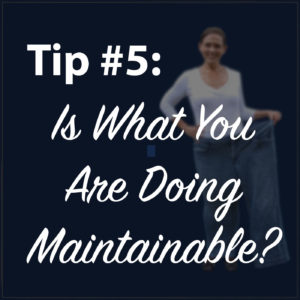 I’ve offered several tips (go here to start with Tip #1) for what to do when you feel like you’ve gotten knocked off track and you’re struggling to get back on.
I’ve offered several tips (go here to start with Tip #1) for what to do when you feel like you’ve gotten knocked off track and you’re struggling to get back on.
I have one more tip, and that is to honestly evaluate whether what you are doing is maintainable. The closer what you’re trying to do — the program you’re following, the workout you’re doing, the way you’re trying to live your life — is to what you were doing before, the better your chance of being able to sustain it.
Say, for example, you were eating fast food for breakfast, fast food for lunch and whatever you could scrounge up for dinner. If that was what you were doing, and now you’re on a Whole30 Program, or now you’re on 20 grams of carbs a day, those are two totally different lifestyles. No wonder you might find it a struggle to keep doing what you’re doing.
When I work with a coaching client or a community member, I always start by asking, “Where are you?” If you’re eating that much fast food in a day, that’s what your life looks like. It’s better to take that and gradually start to implement healthier habits at different times, and throughout the weeks, as opposed to doing it all at once.
A lot of times, people get knocked off and they can’t get back on because what they were doing wasn’t sustainable. Look at what you’re doing and ask, “Is this sustainable? In 30 years, am I going to want my life to look similar to this?”
If the answer is no, you need to start creating healthy, long-term habits. I wrote about this in my book on breaking the diet cycle. We start out with really good intentions. I’m going to do this, and this, and this. You follow the program, and then you get to a place where it’s like,
I don’t know if I can do this anymore. Your body starts to tell you, I don’t know if you can do this anymore. Look at what you normally do. If you’re not eating a healthy breakfast or you’re skipping breakfast, try planning a healthy breakfast for a week. That’s it! Maybe a bowl of oatmeal or some eggs, something very simple.
Don’t try to recreate your entire life all in a matter of a week. If you find you’re eating fast food seven days a week for lunch, see if you can scale that back to three or four. Pack your lunch the other days. Those kinds of small habit changes are not sexy, I will give you that, but they will get you to your goals, and with fewer setbacks.
When your life doesn’t look drastically different, there isn’t a panic mode of “Oh, no, I screwed up” and “How do I get back on track?” On track is pretty much your life with a few slight adjustments. That’s what we want it to be: your life with a few slight adjustments. Not your life completely overhauled and scary and unusual, and now a struggle to get back into.
Is what you are doing maintainable? Is the calorie level you’re at maintainable? Are the carbs that you’re eating maintainable? Is the food restriction maintainable? Ask yourself these questions, because if the answer is a resounding no, then that’s probably why you’re struggling.
I know it’s hard, because once you buy into something, it’s hard to let it go. You don’t want to say maybe you made a mistake, maybe this isn’t for you. Sometimes that’s the healthiest thing to do. Mental health is a big component of this.
Is what you’re doing mentally healthy? If you’re finding you’re obsessing about food, stressing about food, to the point where you don’t know if you can even get to your goal weight, then that’s a problem.
I hope this series of tips was helpful. Please like this post and share it. You are not the only one who struggles with this. Anybody in any type of weight loss situation, chances are, has hit a moment where they feel they can’t get back on track. Pass this around and help out some other people today.